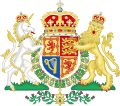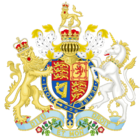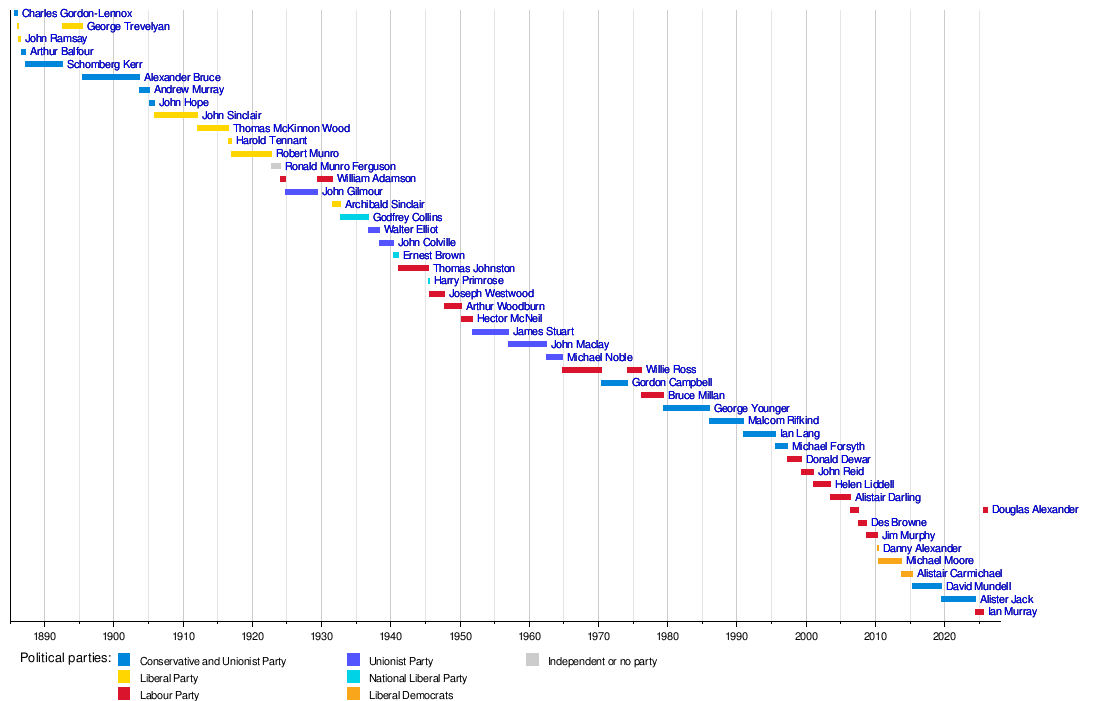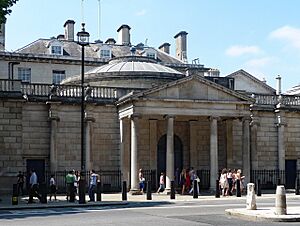Secretary of State for Scotland facts for kids
Quick facts for kids Secretary of State for Scotland |
|
|---|---|

Royal Arms of His Majesty's Government in Scotland
|
|
| Office of the Secretary of State for Scotland | |
| Style | Scottish Secretary (informal) The Right Honourable (within the UK and Commonwealth) |
| Member of | |
| Reports to | The Prime Minister |
| Seat | Westminster |
| Nominator | The Prime Minister |
| Appointer | The Monarch
(on the advice of the Prime Minister)
|
| Term length | At His Majesty's pleasure |
| Formation |
|
| Deputy | Parliamentary Under-Secretary of State for Scotland |
| Salary | £159,038 per annum (2022) (including £86,584 MP salary) |
| Website | Scotland Office |
The Secretary of State for Scotland is an important government job in the United Kingdom. This person is also known as the Scottish Secretary. They are a special minister in the Government of the United Kingdom. Their main job is to lead the Scotland Office.
This Secretary of State is part of the Cabinet of the United Kingdom. The Cabinet is a group of senior ministers who make big decisions for the country. The Scottish Secretary helps make sure that Scotland's interests are heard in the UK Government. They also explain UK Government plans to people in Scotland.
A key part of their role is to protect the rules of Scottish devolution. Devolution means that Scotland has its own Scottish Parliament and Scottish Government to make decisions on many local matters. This system was set up by the Scotland Act 1998. The Secretary also helps the UK Government and the Scottish Government work together. They also manage the relationship between the UK Parliament and the Scottish Parliament.
After 1999, many responsibilities of this role moved to the First Minister of Scotland. This happened when the new Scottish Parliament and Scottish Government were created.
The current Secretary of State for Scotland is Douglas Alexander. He was appointed by Prime Minister Keir Starmer in September 2025. He works with other ministers in the Scotland Office. His main helper is the Parliamentary Under-Secretary of State for Scotland. There is also a Shadow Secretary of State for Scotland from the opposition party.
Contents
Understanding the Secretary of State for Scotland Role
How the Job Started
The Acts of Union in 1707
The job of Secretary of State for Scotland began a long time ago. It was created after the Acts of Union 1707. These Acts joined the Kingdom of England and the Kingdom of Scotland. Together, they formed the Kingdom of Great Britain.
This job was stopped in 1746 after a historical event called the Jacobite rising of 1745. For many years, Scottish matters were handled by the Lord Advocate. Later, in 1827, the Home Office took over these duties.
The job was brought back in 1885, but it was called the Secretary for Scotland. This person was usually part of the UK Cabinet. In 1926, the role became a full Secretary of State position again.
Scotland Gets More Power in 1999
In 1999, Scotland gained more power to make its own decisions. This was called Scottish devolution. Because of this, many of the old powers of the Scottish Office were moved. Most of these powers went to the new Scottish Government. Some also went to other UK government departments.
This meant the Scotland Office had a smaller role. For a few years, from 2003 to 2008, the Scottish Secretary also had another job in the Cabinet. Some people thought this made the Scottish Secretary's role seem less important.
What the Secretary Does Now
Fewer Responsibilities After Devolution
After Scotland got its own Parliament in 1999, the Secretary of State for Scotland's job changed. Many of the powers they used to have moved to the new Scottish Ministers. These new ministers work in the Scottish Parliament and Scottish Government. The First Minister of Scotland now leads many of these areas. For example, Donald Dewar was the first First Minister of Scotland. He had been the Secretary of State for Scotland before that.
However, the Secretary of State still has important duties. They speak for Scotland in the UK Cabinet on matters that the Scottish Parliament does not control. They also hold 'Scotland Questions' once a month. During this time, any Member of Parliament can ask about Scottish issues. But they usually don't ask about things the Scottish Government handles.
The UK Government also has a rule. It will not make laws about things that are already decided by the Scottish Parliament. The Secretary of State is also the group leader of the Scottish Members of Parliament from the ruling party.
Working with the Scottish Government

The Secretary of State for Scotland acts as a link between the UK Government and the Scottish Government. They also connect the UK Parliament and the Scottish Parliament. Because the Secretary is a UK government minister, they must support the UK government's decisions. This means they often promote UK government policies in Scotland.
The role of the Scottish Secretary has become more important recently. This is partly because the Scottish National Party (SNP) has grown stronger. The SNP is interested in Scotland becoming an independent country. The Scotland Office has also seen its budget increase to help with its work.
Key Duties of the Secretary
The UK government website lists the main jobs of the Secretary of State for Scotland:
- They are the UK Government minister who speaks for Scotland in the Cabinet.
- They make sure the rules of Scottish devolution are followed.
- They represent Scotland's interests within the UK Government.
- They explain the UK Government's plans and policies in Scotland.
- They encourage teamwork between the UK Government and the Scottish Government.
- They also help with good relations between the UK Parliament and the Scottish Parliament.
Some politicians have suggested that this job, and the Scotland Office, should be removed. They think the responsibilities are too few. Others have suggested combining the jobs for Scotland, Northern Ireland, and Wales into one 'Secretary of State for the Union'.
In general, all UK government ministers who are Secretaries of State for a specific part of the UK are responsible for:
- Making sure devolution works well. They are key to the relationship between the local government and the UK Government.
- Dealing with laws that affect their area.
- Speaking for their area's interests in Cabinet meetings.
- Answering questions in Parliament about their area.
- Sending money (called a block grant) to the local government.
- Helping the UK Government and local government work together.
- Promoting the interests of their area.
List of Scottish Secretaries
Past Secretaries of State for Scotland (1707–1746)
This section lists the people who held the job of Secretary of State for Scotland. This was after Scotland and England joined together in 1707. The job existed until 1746. After that, the Home Secretary and the Lord Advocate handled Scottish matters for a long time.
- Note: John Erskine, Earl of Mar was already Secretary of State for Scotland before the Union in 1707. He continued in the role after the Union.*
| Secretary of State | Term of office | ||
|---|---|---|---|
 |
John Erskine Earl of Mar |
(since 1705) 1 May 1707 |
3 February 1709 |
 |
James Douglas 2nd Duke of Queensberry |
3 February 1709 |
6 July 1711 |
 |
John Erskine Earl of Mar |
9 September 1713 |
24 September 1714 |
 |
James Graham 1st Duke of Montrose |
24 September 1714 |
August 1715 |
 |
John Ker 1st Duke of Roxburghe |
13 December 1716 |
August 1725 |
 |
John Hay 4th Marquess of Tweeddale |
25 February 1742 |
3 January 1746 |
Office thereafter vacant.
Secretaries for Scotland (1885–1926)
| Secretary for Scotland Act 1885 | |
|---|---|
| Act of Parliament | |

|
|
| Long title | An Act for appointing a Secretary for Scotland and Vice-President of the Scotch Education Department. |
| Citation | 48 & 49 Vict. c. 61 |
| Dates | |
| Royal assent | 14 August 1885 |
|
Status: Amended
|
|
| Text of statute as originally enacted | |
| Text of the Secretary for Scotland Act 1885 as in force today (including any amendments) within the United Kingdom, from legislation.gov.uk | |
The Secretary for Scotland was the main minister for the Scottish Office. This office was created along with the Secretary for Scotland job in 1885. This happened because of the Secretary for Scotland Act 1885. From 1892, this Secretary was part of the UK Cabinet. In 1926, the job was made even more important. It became the full Secretary of State for Scotland.
From 1885 to 1999, these Secretaries also held another special role. They were the Keeper of the Great Seal of Scotland. This is a very old and important symbol. Since 1999, the First Minister of Scotland has held this role.
| Secretary of State | Term of office | Party | Ministry | ||||
|---|---|---|---|---|---|---|---|
 |
Charles Gordon-Lennox 6th Duke of Richmond |
17 August 1885 |
28 January 1886 |
Conservative | Salisbury I | ||
 |
George Trevelyan MP for Hawick Burghs |
8 February 1886 |
March 1886 |
Liberal | Gladstone III | ||
 |
John Ramsay 13th Earl of Dalhousie |
5 April 1886 |
20 July 1886 |
Liberal | |||
 |
Arthur Balfour MP for Manchester East |
5 August 1886 |
11 March 1887 |
Conservative | Salisbury II | ||
 |
Schomberg Kerr 9th Marquess of Lothian |
11 March 1887 |
11 August 1892 |
Conservative | |||
 |
George Trevelyan MP for Glasgow Bridgeton |
18 August 1892 |
21 June 1895 |
Liberal | Gladstone IV | ||
| Rosebery | |||||||
 |
Alexander Bruce 6th Lord Balfour of Burleigh |
29 June 1895 |
9 October 1903 |
Conservative | Salisbury (III & IV) (Con.–Lib.U.) |
||
| Balfour (Con.–Lib.U.) |
|||||||
 |
Andrew Murray MP for Buteshire |
9 October 1903 |
2 February 1905 |
Conservative | |||
 |
John Hope 1st Marquess of Linlithgow |
2 February 1905 |
4 December 1905 |
Conservative | |||
 |
John Sinclair 1st Baron Pentland |
10 December 1905 |
13 February 1912 |
Liberal | Campbell-Bannerman | ||
| Asquith (I–III) |
|||||||
 |
Thomas McKinnon Wood MP for Glasgow St Rollox |
13 February 1912 |
9 July 1916 |
Liberal | |||
| Asquith Coalition (Lib.–Con.–Lab.) |
|||||||
 |
Harold Tennant MP for Berwickshire |
9 July 1916 |
5 December 1916 |
Liberal | |||
 |
Robert Munro MP for Roxburgh and Selkirk |
10 December 1916 |
19 October 1922 |
Liberal | Lloyd George (I & II) (Lib.–Con.–Lab.) |
||
 |
Ronald Munro Ferguson 1st Viscount Novar |
24 October 1922 |
22 January 1924 |
Independent | Law | ||
| Baldwin I | |||||||
 |
William Adamson MP for West Fife |
22 January 1924 |
3 November 1924 |
Labour | MacDonald I | ||
 |
John Gilmour MP for Glasgow Pollok |
6 November 1924 |
26 July 1926 |
Unionist | Baldwin II | ||
Modern Secretaries of State for Scotland (1926–Present)
This table lists the Secretaries of State for Scotland from 1926 until today. This is when the role was officially upgraded to a full Secretary of State position.
| Secretary of State | Term of office | Party | Ministry | ||||
|---|---|---|---|---|---|---|---|
 |
John Gilmour MP for Glasgow Pollok |
26 July 1926 |
4 June 1929 |
Unionist | Baldwin II | ||
 |
William Adamson MP for West Fife |
7 June 1929 |
24 August 1931 |
Labour | MacDonald II | ||
 |
Archibald Sinclair MP for Caithness and Sutherland |
25 August 1931 |
28 September 1932 |
Liberal | National I (N.Lab.–Con.–Lib.N.–Lib.) |
||
| National II (N.Lab.–Con.–Lib.N.–Lib.) |
|||||||
 |
Godfrey Collins MP for Greenock |
28 September 1932 |
29 October 1936 |
Liberal National | |||
| National III (Con.–N.Lab.–Lib.N.) |
|||||||
 |
Walter Elliot MP for Glasgow Kelvingrove |
29 October 1936 |
6 May 1938 |
Unionist | |||
| National IV (Con.–N.Lab.–Lib.N.) |
|||||||
 |
John Colville MP for Midlothian and Peebles Northern |
6 May 1938 |
10 May 1940 |
Unionist | |||
| Chamberlain War (Con.–N.Lab.–Lib.N.) |
|||||||
 |
Ernest Brown MP for Leith |
14 May 1940 |
8 February 1941 |
Liberal National | Churchill War (All parties) |
||
 |
Thomas Johnston MP for West Stirlingshire |
8 February 1941 |
23 May 1945 |
Labour | |||
 |
Harry Primrose 6th Earl of Rosebery |
25 May 1945 |
26 July 1945 |
Liberal National | Churchill Caretaker (Con.–N.Lib.) |
||
 |
Joseph Westwood MP for Stirling and Falkirk |
3 August 1945 |
7 October 1947 |
Labour | Attlee (I & II) |
||
 |
Arthur Woodburn MP for Clackmannan and Eastern Stirlingshire |
7 October 1947 |
28 February 1950 |
Labour | |||
 |
Hector McNeil MP for Greenock |
28 February 1950 |
26 October 1951 |
Labour | |||
| James Stuart MP for Moray and Nairn |
30 October 1951 |
13 January 1957 |
Unionist | Churchill III | |||
| Eden | |||||||
 |
John Maclay MP for West Renfrewshire |
13 January 1957 |
13 July 1962 |
Unionist | Macmillan (I & II) |
||
 |
Michael Noble MP for Argyllshire |
13 July 1962 |
16 October 1964 |
Unionist | |||
| Douglas-Home | |||||||
 |
Willie Ross MP for Kilmarnock |
18 October 1964 |
19 June 1970 |
Labour | Wilson (I & II) |
||
 |
Gordon Campbell MP for Moray and Nairn |
20 June 1970 |
4 March 1974 |
Conservative | Heath | ||
 |
Willie Ross MP for Kilmarnock |
5 March 1974 |
8 April 1976 |
Labour | Wilson (III & IV) |
||
 |
Bruce Millan MP for Glasgow Craigton |
8 April 1976 |
4 May 1979 |
Labour | Callaghan | ||
 |
George Younger MP for Ayr |
5 May 1979 |
11 January 1986 |
Conservative | Thatcher I | ||
| Thatcher II | |||||||
 |
Malcolm Rifkind MP for Edinburgh Pentlands |
11 January 1986 |
28 November 1990 |
Conservative | |||
| Thatcher III | |||||||
 |
Ian Lang MP for Galloway and Upper Nithsdale |
28 November 1990 |
5 July 1995 |
Conservative | Major I | ||
| Major II | |||||||
 |
Michael Forsyth MP for Stirling |
5 July 1995 |
2 May 1997 |
Conservative | |||
 |
Donald Dewar MP for Glasgow Anniesland |
2 May 1997 |
17 May 1999 |
Labour | Blair I | ||
 |
John Reid MP for Hamilton North and Bellshill |
17 May 1999 |
25 January 2001 |
Labour | |||
 |
Helen Liddell MP for Airdrie and Shotts |
25 January 2001 |
13 June 2003 |
Labour | Blair II | ||
 |
Alistair Darling MP for Edinburgh South West |
13 June 2003 |
5 May 2006 |
Labour | |||
| Blair III | |||||||
 |
Douglas Alexander MP for Paisley and Renfrewshire South |
5 May 2006 |
28 June 2007 |
Labour | |||
 |
Des Browne MP for Kilmarnock and Loudoun |
28 June 2007 |
3 October 2008 |
Labour | Brown | ||
 |
Jim Murphy MP for East Renfrewshire |
3 October 2008 |
11 May 2010 |
Labour | |||
 |
Danny Alexander MP for Inverness, Nairn, Badenoch and Strathspey |
12 May 2010 |
29 May 2010 |
Liberal Democrat | Cameron–Clegg (Con.–L.D.) |
||
 |
Michael Moore MP for Berwickshire, Roxburgh and Selkirk |
29 May 2010 |
7 October 2013 |
Liberal Democrat | |||
 |
Alistair Carmichael MP for Orkney and Shetland |
7 October 2013 |
8 May 2015 |
Liberal Democrat | |||
 |
David Mundell MP for Dumfriesshire, Clydesdale and Tweeddale |
11 May 2015 |
24 July 2019 |
Conservative | Cameron II | ||
| May I | |||||||
| May II | |||||||
 |
Alister Jack MP for Dumfries and Galloway |
24 July 2019 |
5 July 2024 |
Conservative | Johnson I | ||
| Johnson II | |||||||
| Truss | |||||||
| Sunak | |||||||
 |
Ian Murray MP for Edinburgh South |
5 July 2024 |
5 September 2025 |
Labour | Starmer | ||
 |
Douglas Alexander MP for Lothian East |
5 September 2025 |
Incumbent | Labour | |||
Timeline of Scottish Secretaries

See also
- First Minister of Scotland
- Secretary of State, a senior post in the pre-Union government of the Kingdom of Scotland
- Under-Secretary of State for Scotland, junior minister supporting the Secretary of State for Scotland
- Shadow Secretary of State for Scotland
- Secretary of State (Jacobite)
- Secretary of State for Northern Ireland
- Secretary of State for Wales
 | Audre Lorde |
 | John Berry Meachum |
 | Ferdinand Lee Barnett |



